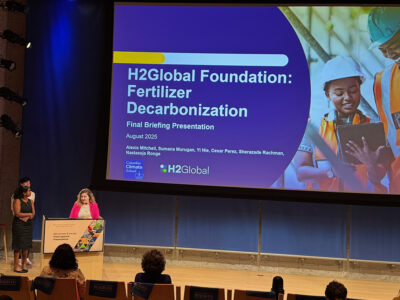Summer vacation means different things to different people. For K-12 educators, summer means time spent revamping last year’s curriculum, updating classroom activities for new cohorts of students, and engaging in professional learning opportunities. Summer 2020 is slightly more complicated than most summers, as educators are facing unprecedented challenges and uncertainty about the upcoming school year. This year, we stepped in to help.
From July 28-31, the Earth Institute unveiled its inaugural professional development program for K-12 educators. “E.I. Teach: Climate Change in the Classroom” was a collective effort across the Institute to prepare educators to bring climate change content into their classrooms.

“Over the years, we’ve learned that climate change content is not that prevalent in classrooms for a variety of reasons,” says Cassie Xu, organizer of the event and director of the Office of Education and Outreach at the Lamont-Doherty Earth Observatory at Columbia University’s Earth Institute. Xu adds “the content isn’t there for a variety of reasons — sometimes educators aren’t familiar enough with the content themselves, sometimes it’s become too political of an issue, and sometimes, it’s just really hard to talk about climate change without the gloom and doom message.” And this is how E.I. Teach was born.
Forty-five educators from 12 different states and 3 different countries joined the remote small group workshops, which took place over four half-day events. At the K-5 levels, participants learned about how scientists use the more than 18,000 core samples housed at the Core Repository of Lamont-Doherty Earth Observatory to understand the stories that sediment cores tell us about Earth’s history. They also learned about dendrochronology, the study of tree rings, and tools for understanding how students impact their environment and how their environments impact them. At the 6-12 levels, participants learned about the fundamental processes underlying how ice sheets and glaciers grow and shrink, why the Thwaites Glacier in Antarctica is known as the Doomsday Glacier, and how geographic information systems (GIS) can provide valuable insights into climate change and sustainable development. The full program is available here.
The Earth Institute is committed to addressing the challenges of global sustainability and climate change through developing programs of research, education, outreach, and practical application of knowledge. E.I. Teach is only one of a number of programs developed for education purposes. In partnership with Columbia University departments and schools, the Earth Institute provides programs of study at the undergraduate, masters, doctoral, and executive levels. Earth Institute LIVE, a virtual platform dedicated to bringing the science of sustainability to the general public, devotes an entire channel to resources for K-12 students. Now E.I. Teach joins the roster as our first program targeted especially for educators of those students. Participation in E.I. Teach provides unparalleled access to experts from the Earth Institute’s numerous centers, including the Lamont Doherty Earth Observatory. As the Earth Institute’s largest research center, the Lamont Doherty Earth Observatory is home to the world’s leading climate scientists who are uniquely positioned to share their expertise with K-12 educators.
Both programs allowed teachers not only to interact with world-renowned scientists, but to network with other educators eager to engage students in a holistic understanding of the climate system and their own role in it. Programming was balanced between informational lectures, engaging activities, and practical demonstrations. The limited enrollment allowed for an intimate environment that gave educators the time and space to process the information and ask questions as learners.

Climate change is a relatively new subject in many schools. High school teacher Jennifer Walton will be teaching her school’s first environmental science class this coming fall. Limited existing models and best practices might leave teachers in her place feeling apprehensive, a feeling that E.I. Teach had eased. “I’m feeling less overwhelmed with developing the climate change theme of this course,” Walton remarked after the first day of the program, enthusing over the “engaging presenters with so many resources and ideas.”
In addition to curricular ideas, E.I. Teach also presented educators with an opportunity to take advantage of new technologies to develop engaging content and hands-on experiences for students, specifically around augmented reality and virtual reality. Presenters focused on the idea that climate change education is a way of understanding the world that can be beneficial for everyone. Climate change is in and of itself a systems problem that involves interconnected and dynamic processes, so our approach to teaching about it should also mimic that connectivity. It is not something that can only be taught as a science. Climate change education has a place in many subjects, and it should aim to teach students about the interactions of the natural, social, and economic worlds. By taking a systems approach to climate change education, students and teachers alike are empowered to bring big ideas and integrated content across all curricular areas.
Educators left the E.I. Teach training armed with not only with straightforward lesson plans, but with the confidence to inspire a new generation of environmental stewards in their classrooms and schools. Education is an essential piece of the puzzle in our local and global response to climate change efforts. This generation of learners will feel the impacts of climate change more than any other, and it is critical that every student is provided an opportunity to study and understand the climate crisis through a comprehensive and interdisciplinary lens across all subject levels and grades. Now more than ever, teachers must be prepared to equip students with the knowledge, attitudes, and behaviors necessary to participate in sustainable global solutions.
Educators interested in E.I. Teach are encouraged to contact Cassie Xu at cassie@ei.columbia.edu for more information.



